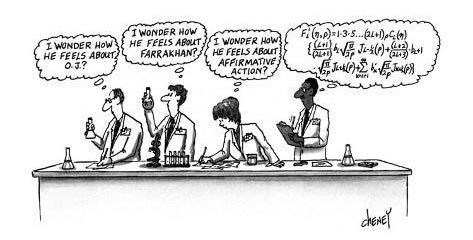When asked about my thoughts on Bill Cosby, or on race-baiting in politics, or on the plight of the inner city, people innocently interrupt other thoughts I’m having: like contemplating the meaning of the standard model of particle physics, or considering the ramifications of solutions to Einstein’s equations that enable backwards time travel, or imagining whether the cosmic horizon will ever wash over the edge of all matter in the universe.
To those people, I’m not a scientist, but a Black scientist, as apparently I am to the New York Times. Their Op-Ed pages have seen three or four of my Op-Eds over the past 15 years. Yet, never has the Times solicited one from me—until now. Did they want my views on space exploration? The Higgs boson? Pluto? No. It was time to get the Black scientist to comment on the Supreme Court’s deliberations in the legality of Affirmative Action policies at the University of Texas at Austin. (I sent the Times a near-identical version of this short correspondence, which was clearly not what they were looking for, and was rejected.)
Meanwhile, hundreds of my colleagues in the physical sciences have already co-signed an open letter to the Supreme Court of the United States on this very topic. Within it, my fellow scientists recognize that this is an education problem. An inclusion problem. A societal problem. More importantly, it’s an American problem. So no, it’s actually not the time to turn to your Black friend for solutions and commentary.
After you’ve read the Open Letter, if anybody is still wondering what I’m thinking, just reference this original Tom Cheney comic from 1999, based on an earlier version that first appeared in The New Yorker, and which hangs permanently on a wall of my office.

Respectfully Sumbitted,

